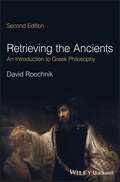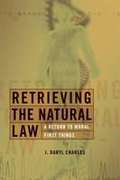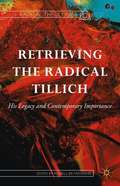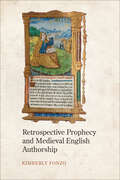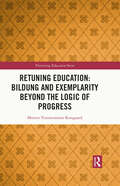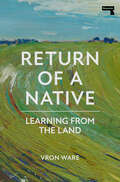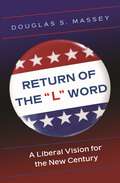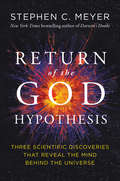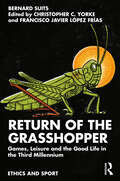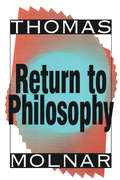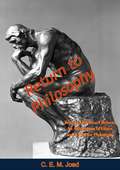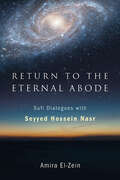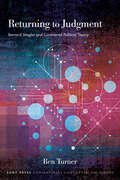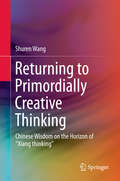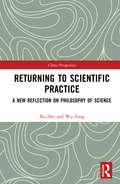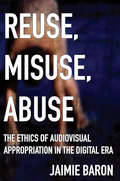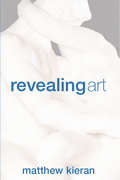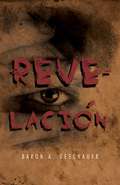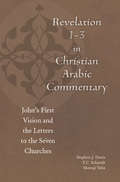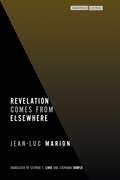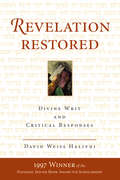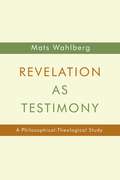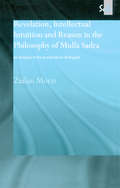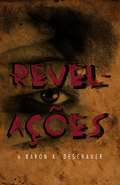- Table View
- List View
Retrieving the Ancients: An Introduction to Greek Philosophy
by David RoochnikProvides an accessible introduction to ancient Greek philosophy, enhanced with new features and content Retrieving the Ancients offers a clear and engaging narrative of one of the most fertile periods in the history of human thought, beginning with the Ionian Philosophers of the sixth century and concluding with the works of Aristotle. Organized chronologically, this student-friendly textbook approaches Greek philosophy as an illuminating conversation in which each key thinker—including Thales, Pythagoras, Democritus, Socrates, and Plato—engages with, responds to, and moves beyond his predecessor. Throughout the text, author David Roochnik highlights how this conversation remains as relevant and urgent to modern readers as ever. Now in its second edition, Retrieving the Ancients features an entirely new epilogue that introduces Stoicism, Epicureanism, Skepticism, Cynicism, and various schools of thought that emerged after Aristotle, as well as a useful appendix designed to help students write philosophically. This edition offers expanded online teaching resources for instructors, including a downloadable web pack with sample syllabi. Offers a compelling, readable, and humorous introduction to ancient Greek philosophy Approaches the history of ancient Greek philosophy dialectically Illustrates how the works of the ancients are as valuable today as ever Includes an accessible, modern introduction to Hellenistic philosophers, new to this editionOffering a sophisticated yet accessible account of the first philosophers of the West, Retrieving the Ancients: An Introduction to Greek Philosophy, Second Edition is an ideal textbook for introductory and intermediate undergraduate courses in Ancient Greek Philosophy, as well as general courses in Ancient Philosophy.
Retrieving the Natural Law: A Return to Moral First Things (Critical issues in Bioethics Series)
by J. CharlesRestating what all people intuit and what this means in moral, specifically bioethical, discourse is the raison d'être for this volume. J. Daryl Charles argues that a traditional metaphysics of natural law lies at the heart of the present reconstructive project, and that a revival in natural-law thinking is of the highest priority for the Christian community as we contend in, rather than abdicate, the public square. <p><p> Nowhere is this more on display than in the realm of bioethics, where the most basic moral questions -- human personhood, human rights versus responsibilities, the reality of moral evil, the basis of civil society -- are being debated. With his timely application of natural-law thinking to the field of bioethics, Charles seeks to breathe new life back into this key debate.
Retrieving the Radical Tillich
by Russell Re ManningPaul Tillich is best known today as a theologian of mediation. Many have come to view him as an out-of-date thinker a safe exemplar of a mid-twentieth-century theological liberalism. The way he has come to be viewed contrasts sharply with the current theological landscape one dominated by the notion of radicality. In this collection, Russell Re Manning breaks with the widespread opinion of Tillich as 'safe' and dated. Retrieving the Radical Tillich depicts the thinker as a radical theologian, strongly marked but never fully determined by the urgent critical demands of his time. From the crisis of a German cultural and religious life after the First World War, to the new realities of religious pluralism, Tillich's theological responses were always profoundly ambivalent, impure and disruptive, asserts Re Manning. The Tillich that is outlined and analyzed by this collection is never merely correlative. Far from the dominant image of the theologian as a liberal accommodationist, Re Manning reintroduces the troubled and troubling figure of the radical Tillich.
Retrospective Prophecy and Medieval English Authorship
by Kimberly FonzoThe prescience of medieval English authors has long been a source of fascination to readers. Retrospective Prophecy and Medieval English Authorship draws attention to the ways that misinterpreted, proleptically added, or dubiously attributed prognostications influenced the reputations of famed Middle English authors. It illuminates the creative ways in which William Langland, John Gower, and Geoffrey Chaucer engaged with prophecy to cultivate their own identities and to speak to the problems of their age. Retrospective Prophecy and Medieval English Authorship examines the prophetic reputations of these well-known medieval authors whose fame made them especially subject to nationalist appropriation. Kimberly Fonzo explains that retrospectively co-opting the prophetic voices of canonical authors aids those looking to excuse or endorse key events of national history by implying that they were destined to happen. She challenges the reputations of Langland, Gower, and Chaucer as prophets of the Protestant Reformation, Richard II’s deposition, and secular Humanism, respectively. This intellectual and critical assessment of medieval authors and their works successfully makes the case that prophecy emerged and recurred as an important theme in medieval authorial self-representations.
Retuning Education: Bildung and Exemplarity Beyond the Logic of Progress (ISSN)
by Morten Timmermann KorsgaardThis book responds to the need for new ways of defining the aims and forms of education, in an age that has seen the ideals of progress and growth lead the planet and its inhabitants to the brink of extinction.Arguing that contemporary ideas of performance and accountability counter "the heart" of education, the book calls for a retuning of education that encourages the younger generation to study objects and ideas for their own sake, rather than to appease established and conventional notions in society – therefore stepping into a common space of reflection and study. The chapters examine why and how we educate, and offer the alternative of engaging with educational questions, not determined by the logic of progress and growth but with an objective of creating a relation to the world around us. Using the works of Hannah Arendt combined with the tradition of Allgemeine Pädagogik to argue for a new conception of Bildung, the book encourages a method that emphasises outrospection over introspection.Ultimately questioning modern-day education, the book redirects and retunes education away from being wholly concerned with achievement and growth, and will therefore be of interest to students, researchers and academics in the fields of philosophy of education, education and curriculum studies, education policy and politics, and sociology of education.
Return of a Native: Learning from the Land
by Vron WareFrom a fixed point in the middle of English nowhere, Vron Ware takes you through time and space to explain why transcending the urban-rural divide is integral to the future of the planet.Rural England is a mythic space, a complex canvas on which people from many different backgrounds project all kinds of fantasies, prejudices, desires and fears. This book seeks to challenge many of these ideas, showing how the artificial divide between rural and urban works to conceal the underlying relationship between these two fundamental poles of human settlement.This investigation of rurality is oriented from a fixed point in north-west Hampshire, marked by a signpost that points in four directions to two towns, four villages and two hamlets. Through stories, interviews and reportage gathered over two decades, the book demolishes tired notions of rural England that cast it as a separate realm of existence, whether marooned in a perpetual time-warp, or reduced to a refuge for the retired, wealthy urbanites, extreme nature-lovers, and, more recently, anyone tired of waiting out the pandemic in towns and cities. It poses two simple questions: what does the word rural mean today? What will it mean tomorrow?The author is an ambivalent native, held captive to the land by an umbilical cord but always on the verge of fleeing home to the city. She writes from a feminist, postcolonial standpoint that is alert to the slow violence of historical processes taking place over many centuries; enslavement, colonialism, industrialisation, globalisation. Both argument and narrative are propelled by the urgent need to reconsider the concept of &‘countryside&’ in the context of the climate emergency and the patent collapse of ecosystems due to intensive farming which has poisoned the land.
Return of the "L" Word: A Liberal Vision for the New Century
by Douglas S. MasseySomewhere in the 1970s liberals in the United States lost their way. After successes like the New Deal, they became arrogant. So argues Douglas Massey in Return of the "L" Word. Faced with the difficult politics of race and class, liberals used the heavy hand of government to impose policies on a resentful public. Conservatives capitalized on this with a staunch ideology of free markets, limited government, and conservative social values. The time is ripe for a liberal realignment, declares Massey, but what has been lacking is a consistent liberal ideology that explains to voters, in simple terms, government's vital role in producing a healthier, more financially equitable, less divided society. This book supplies that ideology. Massey begins his powerful manifesto by laying out the liberals' mistakes over the past twenty years. Drawing on insights from the expanding field of economic sociology, he then sets forth a clear set of liberal principles to explain how markets work in society, principles he applies to articulate salable liberal policies. After outlining a new liberal political philosophy, Massey traces liberalism's opposition and says plainly: liberals should have no illusions about the competition's resolve and skill. He closes with a practical approach to liberal coalition-building in America. The political economy conservatives have constructed in recent decades has benefited 20 percent of the people. Liberal success requires a return to material rather than symbolic politics, showing most Americans why it is in their economic as well as moral interest to support the liberal cause.
Return of the God Hypothesis: Three Scientific Discoveries That Reveal the Mind Behind the Universe
by Stephen C. MeyerThe New York Times bestselling author of Darwin’s Doubt presents groundbreaking scientific evidence of the existence of God, based on breakthroughs in physics, cosmology, and biology. Beginning in the late 19th century, many intellectuals began to insist that scientific knowledge conflicts with traditional theistic belief—that science and belief in God are “at war.” Philosopher of science Stephen Meyer challenges this view by examining three scientific discoveries with decidedly theistic implications. Building on the case for the intelligent design of life that he developed in Signature in the Cell and Darwin’s Doubt, Meyer demonstrates how discoveries in cosmology and physics coupled with those in biology help to establish the identity of the designing intelligence behind life and the universe. Meyer argues that theism — with its affirmation of a transcendent, intelligent and active creator — best explains the evidence we have concerning biological and cosmological origins. Previously Meyer refrained from attempting to answer questions about “who” might have designed life. Now he provides an evidence-based answer to perhaps the ultimate mystery of the universe. In so doing, he reveals a stunning conclusion: the data support not just the existence of an intelligent designer of some kind—but the existence of a personal God.
Return of the Grasshopper: Games, Leisure and the Good Life in the Third Millennium (Ethics and Sport)
by Bernard SuitsIn this sequel to Bernard Suits’ timeless classic philosophical work The Grasshopper: Games, Life and Utopia, published in its full and unabridged form for the first time, Suits continues to explore some of our most fundamental philosophical questions, including the value of sport and games, and their relationship to the good life. In Return of the Grasshopper, Suits puts his theoretical cards on the table, exploring the in-depth implications of his definition of utopia, assessing the merits of a gamified philosophy, and explaining how games can provide an existential balm against the fear of death. Perhaps most importantly, for the first time in print, Suits reveals his underlying worldview: that humanity is forever fated to endure a cyclical existence of privation, brought on by material scarcity, and boredom, resulting from material plenitude. An essential companion to The Grasshopper, this edition includes an introductory chapter that puts Suits’ life and work into context, helping the reader to understand why Suits has had such a profound influence on contemporary philosophy and how his ideas still provide powerful insight into the human condition. This book is important reading for anybody with an interest in the philosophy of sport, leisure and play, political philosophy, ethics, existentialism or utopian studies.
Return to Philosophy
by Thomas MolnarFrom its earliest beginnings and through much of its history, the philosophical enterprise has rooted its intellectual procedures in common sense. Ordinary discourse is what the pre-Socratic thinkers did at the dawn of speculation. The same approach was characteristic of the medieval mystics, Pascal in the seventeenth century, and Gaston Bachelard in the twentieth century. However with the ascendency of the physical sciences, mathematics, and depth psychology as influences in contemporary thought, philosophical language and forms of expression became increasingly distant from ordinary language. This created estrangement and confusion in the learner's mind. In Return to Philosophy Thomas Molnar diagnoses the verbal derailment of philosophy and shows how it might be reconnected to the realities of human life.While granting that philosophy must use a somewhat specialized language, Molnar attacks jargon-laden thought by tracing certain root assumptions that go deeper than the issue of language itself. He locates these assumptions in the work of philosophers who, espousing modernity, no longer trust the "reality of the real," and are convinced that the world and our perception of it are elusive, offering no foundation except in the human mind which, however, is also the result of a "social contract," a temporary consensus or transient network of meanings readily discardable. According to changing ideologies and social structures we use "signs" linguistic, psychological, hermeneutical, structuralist, existentialist not to express reality but to establish communication with others. Philosophy, then, shifts from the task of knowing reality to the task of communicating here and now.Return to Philosophy is a unique endeavor. Molnar's book unmasks the modern derailment and shows that many leading philosophers do not so much philosophize, but merely elaborate verbal-technical instruments in what may be little more than trivial language games. This volume will be of interest to philosophers, cultural historians, and sociologists.
Return to Philosophy: Being A Defence of Reason, An Affirmation of Values, and A Plea for Philosophy
by C. E. M. Joad“Many people today adopt an instinctively derogatory attitude to reason. It is not, they say, a free activity of the mind, reaching conclusions under no compulsion save that of the evidence; it is the tool of instinct and the handmaid of desire. They are sceptical also in their attitude towards values. Beauty, they hold, is not an intrinsic quality of things; it is merely the compliment which we bestow upon the objects which have been fortunate enough to give us pleasure. One man’s pleasure is as good as another’s, and all the art criticism in the world is only an elaborate series of variations upon the theme: ‘This is what I happen to like.’ As with art, so with morals. To act rightly is merely to act in a way of which other people approve.“It is the object of the following pages to criticize this subjectivist attitude and to expose its inadequacy in art, in morals, and in thought. The book is, therefore, in effect a restatement in modern terms of certain traditional beliefs; that reason, if properly employed, can give us truth; that beauty is a real value which exists, and that we can train our minds and form our tastes to discern it; that some things are really right in a sense in which others are really wrong, and that the endeavour to know truth and to discern value is the noblest pursuit of the adult civilized intelligence. The best name for this pursuit is philosophy. This conclusion is reached by a number of different routes, each of which starting from some distinctive characteristic of modern life or thought, an aeroplane shed, a quasi-religious cult, or an essay of Aldous Huxley converges upon the same position. The defence of reason, the affirmation of values and the plea for philosophy thus constitute the underlying theme which links together the various essays which follow.”—Foreword
Return to Reason
by Stephen ToulminThe turmoil and brutality of the twentieth century have made it increasingly difficult to maintain faith in the ability of reason to fashion a stable and peaceful world. After the ravages of global conflict and a Cold War that divided the world's loyalties, how are we to master our doubts and face the twenty-first century with hope? In Return to Reason, Stephen Toulmin argues that the potential for reason to improve our lives has been hampered by a serious imbalance in our pursuit of knowledge. The centuries-old dominance of rationality, a mathematical mode of reasoning modeled on theory and universal certainties, has diminished the value of reasonableness, a system of humane judgments based on personal experience and practice. To this day, academic disciplines such as economics and professions such as law and medicine often value expert knowledge and abstract models above the testimony of diverse cultures and the practical experience of individuals. Now, at the beginning of a new century, Toulmin sums up a lifetime of distinguished work and issues a powerful call to redress the balance between rationality and reasonableness. His vision does not reject the valuable fruits of science and technology, but requires awareness of the human consequences of our discoveries. Toulmin argues for the need to confront the challenge of an uncertain and unpredictable world, not with inflexible ideologies and abstract theories, but by returning to a more humane and compassionate form of reason, one that accepts the diversity and complexity that is human nature as an essential beginning for all intellectual inquiry.
Return to the Eternal Abode: Sufi Dialogues with Seyyed Hossein Nasr (SUNY series in Islam)
by Seyyed Hossein Nasr Amira El-ZeinReturn to the Eternal Abode is a series of in-depth discussions between Amira El-Zein and Seyyed Hossein Nasr, one of the world's foremost scholars of Islamic, religious, and comparative studies. Each of the six chapters addresses a central theme at the heart of Sufism: creativity, cosmology, the environment, poetry, art, and modernity. Nasr's answers to El-Zein's probing questions offer thought-provoking, comprehensive, and interdisciplinary approaches to these aspects of the Sufi tradition, reflecting a lifetime of scholarship and comfortably synthesizing various sources, philosophies, and traditions, both Islamic and otherwise. The book also sheds light on Nasr's relations to eminent thinkers of the twentieth century, such as Titus Burckhardt, Mircea Eliade, Louis Massignon, and Henry Corbin and provides, in many ways, an accessible synopsis or overview of his entire oeuvre.
Returning to Judgment: Bernard Stiegler and Continental Political Theory (SUNY series in Contemporary Continental Philosophy)
by Ben TurnerReturning to Judgment provides the first extensive treatment of political judgment in the work of Bernard Stiegler and the first account of his significance for contemporary continental political thought. Ben Turner argues that Stiegler breaks with his predecessors in continental philosophy by advocating for, rather than retreating from, the task of proposing totalizing judgments on political problems that extend beyond the local and the particular. He shows that the reconciliation of judgment with continental political thought's commitment to anti-totalization structures the entirety of Stiegler's philosophy and demonstrates that this theory of the political decision highlights the difficulties that contemporary political ontology faces when addressing global and large-scale political problems. The book provides an overview of Stiegler's philosophy useful for those unfamiliar with his thought, shows how he draws on key influences including Deleuze, Derrida, Freud, and Simondon to develop his conception of judgment, and considers the challenges and consequences of his embrace of totalizing political decisions.
Returning to Primordially Creative Thinking: Chinese Wisdom On The Horizon Of Xiang Thinking
by Lin Zhang Shuren WangThis book identifies that “Xiang thinking” is the eidetic connotation and a fundamental trait of traditional Chinese thinking, offering insights of considerable methodological significance. "Xiang thinking" is a mode of thinking different from conceptual thinking or idealized rational thinking and, in a certain sense, it is more primal. In the past century, particularly since 1949, the primary works on Chinese philosophical history have, as a rule, addressed the ancient Chinese tradition of philosophical ideas by virtue of the philosophies of Plato, Descartes and Hegel: methods that inherently challenge Chinese philosophical insights. This has naturally led to the fact that the insights as such remained obscured. This book starts to reverse this trend, intending to help Chinese people understand and appraise themselves in a more down-to-earth fashion. In addition, it is particularly helpful to people of other cultures if they want to understand ancient Chinese philosophy and culture in a context of fresh and inspiring philosophical ideas. (By Zhang Xianglong)
Returning to Scientific Practice: A New Reflection on Philosophy of Science (China Perspectives)
by Xu Zhu Wu TongThis book is a result from a collective study on philosophy of scientific practice (PSP), which began around 2002 and still ongoing. There is an apparently increasing interest in scientific practice, influenced by the historicistic philosophy of science and the sociology of scientific knowledge (SSK). Prof. WU Tong and his research group believe that it is necessary for PSP to turn from the theory-dominant position to the practice dominance. PSP has also put forward the possibility of reinterpreting the epistemic status of local knowledge in Chinese tradition, which provides the most significant motivation to participate this study. In this book, we have selected three main cases – namely, Chinese medicine, Fengshui, and Ethnobotany – to examine the effect of PSP. The aim of our collective study is not merely on theoretical construction of PSP, but also to consider the various applications of PSP, especially for re-interpreting and demonstrating the variety of local knowledge from traditional China, which seems to be a genuine contribution to the international enterprise of philosophy of science, particularly made by Chinese scholars.
Reuse, Misuse, Abuse: The Ethics of Audiovisual Appropriation in the Digital Era
by Jaimie BaronIn contemporary culture, existing audiovisual recordings are constantly reused and repurposed for various ends, raising questions regarding the ethics of such appropriations, particularly when the recording depicts actual people and events. Every reuse of a preexisting recording is, on some level, a misuse in that it was not intended or at least anticipated by the original maker, but not all misuses are necessarily unethical. In fact, there are many instances of productive misuse that seem justified. At the same time, there are other instances in which the misuse shades into abuse. Documentary scholars have long engaged with the question of the ethical responsibility of documentary makers in relation to their subjects. But what happens when this responsibility is set at a remove, when the recording already exists for the taking and repurposing? Reuse, Misuse and Abuse surveys a range of contemporary films and videos that appropriate preexisting footage and attempts to theorize their ethical implications.
Revealing Art
by Matthew KieranWhy does art matter to us, and what makes it good? Why is the role of imagination so important in art? Illustrated with carefully chosen colour and black-and-white plates of examples from Michaelangelo to Matisse and Poussin to Pollock, Revealing Art takes us on a compelling and provocative journey.Kieran explores some of the most important questions we can ask ourselves about art: how can art inspire us or disgust us? Is artistic judgement simply a matter of taste? Can art be immoral or obscene, and should it be censored? He brings such abstract issues to life with fascinating discussions of individual paintings, photographs and sculptures, such as Michelangelo's Pieta, Andres Serrano's Piss Christ and Francis Bacon's powerful paintings of the Pope.He also suggests some answers to problems that any one in an art gallery or museum is likely to ask themselves: what is a beautiful work of art? and can art really reveal something true about our own nature?Revealing Art is ideal for anyone interested in debates about art today, or who has simply stood in front of a painting and felt baffled.
Revelación a Baron A. Deschauer
by Baron Alexander DeschauerDESCRIPCIÓN DEL LIBRO Este libro establece el secreto de estar contento y feliz. Establece el significado de la vida. Establece las infinitas posibilidades disponibles para todos nosotros. Este libro está escrito de una manera que todos puedan entender sin referencia a personas vivas o muertas ni que requieren años de estudio filosófico o teológico. Presenta ideas que trascienden barreras sociales, económicas y académicas. Como un espejo refleja la imagen del espectador, este libro reflejará los pensamientos y experiencias del lector. El objetivo de este libro es tener una mayor comprensión por parte del lector de sí misma y su conexión absoluta con todos los seres vivos. Para tener un mayor efecto, se recomienda leer los capítulos en voz alta.
Revelation 1-3 in Christian Arabic Commentary: John's First Vision and the Letters to the Seven Churches (Christian Arabic Texts in Translation)
by Stephen J. Davis T. C. Schmidt Shawqi Talia Būlus Al-Būshī Ibn Kātib QayṣarThe first publication in a new series—Christian Arabic Texts in Translation, edited by Stephen Davis—this book presents English-language excerpts from thirteenth-century commentaries on the Apocalypse of John by two Egyptian authors, Būlus al-Būshī and Ibn Kātib Qas.ar. Accompanied by scholarly introductions and critical annotations, this edition will provide a valuable entry-point to important but understudied theological work taking place at the at the meeting-points of the medieval Christian and Muslim worlds.
Revelation Comes from Elsewhere (Cultural Memory in the Present)
by Jean-Luc MarionJean-Luc Marion has long endeavored to broaden our view of truth. In this illuminating new book—his deepest engagement with theology to date—Marion proposes a rigorous new understanding of human and divine revelation in a deeply phenomenological key. Although today considered the central theme of theology, the concept of Revelation was almost entirely unknown to the first millennium of Christian thought. In a penetrating historical deconstruction, Marion traces the development of this term to the rise of metaphysics from Aquinas through Suárez, Descartes, and Kant; formalized into an epistemological framework, this understanding of Revelation has restricted philosophical and theological thinking ever since. To break free from these limits, Marion takes hints from theologians including Barth and Balthasar while mobilizing the phenomenology of givenness to provide a rigorous new understanding of revelation as a mode of uncovering. His extensive study of the Jewish and Christian Scriptures unfolds a logic of Trinitarian phenomenality, worked out in conversation with Basil, Augustine, Hegel, Schelling, and others, that ultimately transforms our very notions of being and time. The result is precisely what we have come to expect from this acclaimed philosopher: masterful historical scholarship working in tandem with daring originality.
Revelation Restored: Divine Writ And Critical Responses (Radical Traditions Ser.)
by David W HalivniIn this thought-provoking book, David Weiss Halivni asserts that the act of acknowledging and accounting for inconsistencies in the Pentateuchal text is not alien to the Biblical or Rabbinic tradition and need not belie the tradition of revelation. Moreover, the author argues that through recognizing textual problems in the scriptures, as well as e
Revelation as Testimony: A Philosophical-Theological Study
by Mats WahlbergAccording to the pre-modern Christian tradition, knowledge of God is mainly testimonial: we know certain important truths about God and divine things because God himself has told them to us. In academic theology of late this view is often summarily dismissed. But to do so is a mistake, claims Mats Wahlberg, who argues that the testimonial understanding of revelation is indispensable to Christian theology.Criticizing the currently common idea that revelation should be construed exclusively in terms of God’s self manifestation in history or through inner experience, Wahlberg discusses the concept of divine testimony in the context of the debate about how any knowledge of God is possible. He draws on resources from contemporary analytic philosophy -- especially John McDowell and Nicholas Wolterstorff -- to argue for the intellectual viability of revelation as divine testimony.
Revelation, Intellectual Intuition and Reason in the Philosophy of Mulla Sadra: An Analysis of the al-hikmah al-'arshiyyah (Routledge Sufi Series)
by Zailan MorisThis book examines and analyses the legitimacy of the widely held claim that Mulla Sadra's philosophy (al-hikmah al-muta'aliyyah) is a synthesis of principles and doctrines drawn from revelation (wahy), gnosis ('irfan/ma'rifah) and discursive philosophy (al-hikmah al-bahthiyyah). In Mulla Sadra's view, these three major sources of knowledge can be brought together without contradiction and accorded their respective roles in the human quest for true and certain knowledge. This book discusses and demonstrates how Mulla Sadra achieves this synthesis as contained in and exemplified by his text, al-Hikmah al-'arshiyyah or Wisdom from the Divine Throne. An evaluation on whether or not Mulla Sadra's synthesis is successful is also undertaken. The criteria used for the evaluation are the internal coherence of his ideas, their conformity to Islamic teachings and impact on Islamic thinkers after him.
Revelações a Baron A. Deschauer
by Baron Alexander DeschauerEste livro define o segredo de ser feliz e contente. Ele define o significado da vida. Ele define as infinitas possibilidades que estão disponíveis para todos nós. Este livro é escrito de uma maneira que todos possam entender, sem referência a pessoas vivas ou mortas, nem exigindo anos de estudo filosófico ou teológico. Apresenta idéias que transcendem as barreiras sociais, econômicas e acadêmicas. Como um espelho reflete a imagem do espectador, este livro refletirá os pensamentos e experiências do leitor. O objetivo deste livro é oferecer ao leitor uma maior compreensão sobre si mesmo e de sua conexão absoluta com todas as coisas vivas
